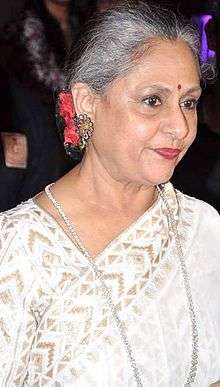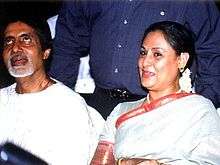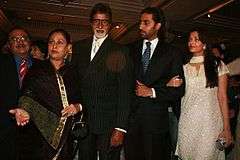Jaya Bachchan
| Jaya Bachchan | |
|---|---|
 Jaya Bachchan at Seventy Art show for Big B’s birthday | |
| MP of Rajya Sabha for Uttar Pradesh | |
|
Assumed office 3 April 2012 | |
| Personal details | |
| Born |
Jaya Bhaduri 9 April 1948[1] Jabalpur, Madhya Pradesh, India |
| Political party | Samajwadi Party |
| Spouse(s) | Amitabh Bachchan (m. 1973) |
| Relations | See Bachchan family |
| Children | Abhishek, Shweta |
| Awards | Padma Shri (1992) |
| Years active | 1971–1981,1998–present |
Jaya Bhaduri Bachchan (Bengali: জয়া ভাদুরি ) (born Jaya Bhaduri; 1948) is an Indian politician and film actress. Bachchan is recognised as one of the finest Hindi film actresses of her time, particularly known for reinforcing a naturalistic style of acting in both mainstream and 'middle-of-the-road' cinema.[2][3] During her career, she won eight Filmfare Awards: including three for Best Actress and three for Best Supporting Actress, which makes her the overall most-awarded performer in the female acting categories, along with Nutan. She was awarded the Filmfare Lifetime Achievement Award in 2007. In 1992, she was awarded the Padma Shri by the Government of India.[4]
Making her film debut as a teenager in Satyajit Ray's Mahanagar (1963), Bachchan's first screen role as an adult was in Guddi (1971), directed by Hrishikesh Mukherjee, with whom she would collaborate in several films. She was noted for her performances in films including Uphaar (1971), Koshish (1972), Kora Kagaz (1974), among others.She appeared alongside her husband Amitabh Bachchan in films such as Zanjeer (1973), Abhimaan (1973), Chupke Chupke (1975), Mili (1975) and Sholay (1975).
Following her marriage to actor Amitabh Bachchan and the birth of her children, Bachchan restricted her film work in the coming years and after her appearance in the 1981 film Silsila, she took an indefinite sabbatical from films. She returned to acting with Govind Nihalani's Hazaar Chaurasi Ki Maa in 1998. Since then, she has appeared in several commercially successful films such as Fiza (2000), Kabhi Khushi Kabhie Gham... (2001), Kal Ho Naa Ho (2003), which garnered her critical acclaim as well as several awards and nominations.
Early life
Jaya Bhaduri was born in Jabalpur[5] to a Hindu Bengali family. Her mother is Indira Bhaduri and her father, Taroon Kumar Bhaduri, was a writer, journalist and stage artist. She did her schooling from St. Joseph's Convent Sr. Sec. School, Bhopal and was the head girl of her school. She was awarded the Best All-India N.C.C. Cadet Award during the Republic Day celebrations in 1966.[6]
Career
Jaya Bachchan, an alumna of the Film and Television Institute of India, started her career with a supporting role in Satyajit Ray's Bengali film, Mahanagar at the age of 15, with Anil Chatterjee and Madhabi Mukherjee. Prior to this, she had appeared in two Bengali films: a 13-minute short film, Suman,[7] and a Bengali comedy Dhanni Meye (1971), as Uttam Kumar's sister-in-law.[8]
Inspired by her experience with Ray, she decided to join Film and Television Institute of India (FTII), Pune to learn acting, and passed out with the gold medal,[9] and she was also picked out to play the eponymous role of Guddi in the 1971 Hrishikesh Mukherjee's film, Guddi in which she played a schoolgirl obsessed with film star Dharmendra.[10] Guddi was a success,[8] and she moved to Mumbai and soon picked other roles, however her role of a 14-year-old school girl, aided by her petite looks, created the girl-next-door image for her, which she was often associated with through the rest of her career. Though she tried to break out of the mould with glamourous roles as in Jawani Diwani (1972)[2] and a negative character of the heroine faking amnesia, in Anamika (1973), she was mostly recognised for roles of this sort, which were credited with epitomising middle-class sensibility and which she played amiably in films of "middle-cinema" directors like Gulzar, Basu Chatterjee and indeed Hrishikesh Mukherjee.[11] These films include Uphaar (1971), Piya Ka Ghar (1972), Parichay (1972), Koshish (1972) and Bawarchi (1972), with marked sensitivity.[10][12] By now, she was a popular star.[8]
In Gulzar's Koshish (1973), Bhaduri and Sanjeev Kumar played a deaf couple who struggle through their difficulties as handicapped people. She described the film as "a learning experience" which motivated to do social work in future.[13]
She first acted with her future husband Amitabh Bachchan in the film, Bansi Birju (1972), followed by B.R. Ishara's Ek Nazar also in the same year.[8] Amitabh had undergone a string of flops, and when most lead heroines refused to work him, in Salim-Javed scripted, Zanjeer (1973), she stepped into the film. The film turned out to be a hit and gave rise to Amitabh Bachchan's angry-young-man image.[14] This was closely followed by their pairing in films like Abhimaan (1973), Chupke Chupke (1975) and Sholay (1975).

Her daughter Shweta was born while Jaya and Amitabh were working on Sholay. Following this she retired from films and focused on raising her children. Her last film as a lead actress was Silsila (1981), opposite her husband. During the late 1980s, she wrote the story for the film Shahenshah (1988) which starred her husband in the lead.
After a gap in film appearances of 18 years, she returned to acting with Govind Nihalani's Hazaar Chaurasi Ki Maa (1998), a film about the Naxalite movement. In 2000 she starred in Fiza for which she received the Filmfare Best Supporting Actress Award for her work. She also starred in Karan Johar's family drama Kabhi Khushi Kabhie Gham (2001) with her husband. She then starred in Karan Johar's next film, Kal Ho Naa Ho (2003) playing the role of Preity Zinta's mother, Jennifer, for which she again received a Filmfare Best Supporting Actress Award.[15] She appeared with her son Abhishek in the films Laaga Chunari Mein Daag (2007) and Drona (2008).
In 2011, she appeared in the Bangladeshi film Meherjaan starring with Victor Banerjee and Humayun Faridi. The film is based on a Bangladesh-Pakistan love story in the backdrop of 1971 Bangladesh atrocities. It is the story of Meherjaan (played by Jaya Bachchan), a Bangladeshi woman who falls in love with a Pakistani army officer who refuses to join the war and saves her from being raped by other Pakistani troops, who do not however spare her cousin Neela and kill her father.[16]
Political career
Bachchan was first elected in 2004 as a Samajwadi Party member of parliament, representing Rajya Sabha, and in February 2010 she stated her intent to complete her term.[17] She was re-elected in 2012.
Controversies
Bachchan's speech during the music launch of film Drona was criticized by some sections of politicians in Maharashtra. In response to the film's director, Goldie Behl, making his introductory speech in English, she said "Hum UP ke log hain, isliye Hindi mein baat karenge, Maharashtra ke log maaf kijiye". (We are from UP, so we will speak in Hindi. People of Maharashtra, please excuse us) Subsequently, she encouraged actress Priyanka Chopra to speak in Hindi.[18]Maharashtra Navnirman Sena (MNS) president Raj Thackeray commented that Jaya had no business alluding to all the people of Maharashtra in that statement. He threatened to ban all Bachchan films unless Jaya apologized in a public forum for hurting Maharashtrians. MNS workers began to attack theaters screening The Last Lear starring her husband, Amitabh Bachchan. Shiv Sena MP Sanjay Raut also criticized her statement saying: "After making all your success and fortune in Mumbai, if you feel like saying that, we are from UP, its very unfortunate." Amitabh Bachchan tendered an apology for her statements on her behalf.[19]
Personal life
.jpg)

On 3 June 1973, she married actor Amitabh Bachchan. The couple has two children: Shweta Bachchan-Nanda and Abhishek Bachchan, who is also an actor. Shweta is married to industrialist Nikhil Nanda of Kapoor family in Delhi, and has two children, Navya Naveli and Agastya Nanda,[20] while Abhishek Bachchan is married to Aishwarya Rai, and has a daughter, Aaradhya Bachchan.[21]
Awards and recognition
Civilian Award
- 1992 – Padma Shri, India's fourth highest civilian award from the Government of India.
Winner
- 1974 – Filmfare Best Actress Award for Abhimaan
- 1975 – Filmfare Best Actress Award for Kora Kagaz
- 1980 – Filmfare Best Actress Award for Nauker
- 1998 – Filmfare Special Award for Hazaar Chaurasi Ki Maa
- 2001 – Filmfare Best Supporting Actress Award for Fiza
- 2002 – Filmfare Best Supporting Actress Award for Kabhi Khushi Kabhie Gham
- 2004 – Filmfare Best Supporting Actress Award for Kal Ho Na Ho
- 2007 – Filmfare Lifetime Achievement Award
Nominated
- 1972 – Filmfare Best Actress Award for Guddi
- 1972 – Filmfare Best Actress Award for Uphaar
- 1974 – Filmfare Best Actress Award for Koshish
- 1976 – Filmfare Best Actress Award for Mili
- 1982 – Filmfare Best Actress Award for Silsila
International Indian Film Academy Awards Winner
- 2001 – IIFA Best Supporting Actress Award for Fiza
- 2002 – IIFA Best Supporting Actress Award for Kabhi Khushi Kabhie Gham
- 2004 – IIFA Best Supporting Actress Award for Kal Ho Na Ho
Other film awards
Winner
- 1972 – Bengal Film Journalists' Association Awards: Special Award (Hindi film) for Guddi[22]
- 1999 – Anandalok Awards: Special Editor Award
- 2001 – Bengal Film Journalists' Association Awards: Best Actress in Supporting Role for Fiza[23]
- 2001 – Zee Cine Award for Best Actor in a Supporting Role – Female for Fiza
- 2002 – Best Actress in a supporting role for Kabhi Khushi Kabhie Gham at the Sansui Viewers Choice Awards[24]
Honours and recognitions
- In 1998, she was honoured with the Omega Award for Excellence: Lifetime Achievement.[25]
- 2000, Mumbai Academy of the Moving Image, an award for her "abiding contribution to Cinema".[26]
- 2004, Lifetime Achievement Award at the Sansui Awards.[27]
- 2010, Lifetime Achievement Award at the "Tongues on Fire" film festival in London.[28][29]
- 2012, Lifetime Achievement Award at Jaipur International Film Festival (JIFF).[30]
- 2013, Master Deenanath Mangeshkar (Vishesh Puraskar) Award for her dedicated services to Indian theatre and cinema.[31]
- She is a recipient of the "Yash Bharati Samman", UP state's highest award from the Government of Uttar Pradesh.[32]
Filmography
| Year | Film | Role | Other notes |
|---|---|---|---|
| 1963 | Mahanagar | Bani | Bengali film |
| 1971 | Guddi | Kusum/Guddi | Nominated—Filmfare Best Actress Award |
| 1971 | Dhanni Meye | Monasha | Bengali film |
| 1971 | Uphaar | Mrinmayi/Meenu | Nominated—Filmfare Best Actress Award |
| 1972 | Jawani Diwani | Neeta Thakur | |
| 1972 | Bawarchi | Krishna Sharma | |
| 1972 | Parichay | Rama | |
| 1972 | Bansi Birju | Bansi | |
| 1972 | Piya Ka Ghar | Malti | |
| 1972 | Annadata | ||
| 1972 | Ek Nazar | Shabnam | |
| 1972 | Samadhi | ||
| 1972 | Koshish | Aarti Mathur | Nominated—Filmfare Best Actress Award |
| 1972 | Shor | Raat Ki Rani/Rani | |
| 1972 | Jai Jawan Jai Makan | ||
| 1973 | Gaai Aur Gori | Neeta Thakur | |
| 1973 | Anamika | Anamika/Kanchan/Archana | |
| 1973 | Phagun | Krishna Sharma | |
| 1973 | Zanjeer | Mala | |
| 1973 | Abhimaan | Uma Kumar | Filmfare Best Actress Award |
| 1974 | Aahat | ||
| 1974 | Dil Diwana | ||
| 1974 | Kora Kagaz | Archana Gupta | Filmfare Best Actress Award |
| 1974 | Naya Din Nai Raat | ||
| 1974 | Doosri Sita | ||
| 1975 | Mili | Mili Khanna | Nominated—Filmfare Best Actress Award |
| 1975 | Chupke Chupke | Vasudha Kumar | |
| 1975 | Sholay | Radha | |
| 1977 | Abhi To Jee Lein | Jaya | |
| 1978 | Ek Baap Chhe Bete | ||
| 1979 | Nauker | Geeta | Filmfare Best Actress Award |
| 1981 | Silsila | Shobha Malhotra | Nominated—Filmfare Best Actress Award |
| 1995 | Akka | Marathi Film (Appearance with Amitabh Bachachan) | |
| 1998 | Hazaar Chaurasi Ki Maa | Sujata Chatterji | |
| 2000 | Fiza | Nishatbi Ikramullah | Filmfare Best Supporting Actress Award |
| 2001 | Kabhi Khushi Kabhie Gham... | Nandini Raichand | Filmfare Best Supporting Actress Award |
| 2002 | Koi Mere Dil Se Poochhe | Mansi Devi | |
| 2002 | Desh | Suprabha Devi | Bengali film |
| 2003 | Kal Ho Naa Ho | Jennifer Kapur | Filmfare Best Supporting Actress Award |
| 2007 | Laaga Chunari Mein Daag | Sabitri Sahay | |
| 2008 | Lovesongs | ||
| 2008 | Drona | Queen Jayanti | |
| 2010 | Aap Ke Liye Hum | ||
| 2011 | Meherjaan | Meher | Bengali, Bangladeshi film |
| 2013 | Sunglass / Taak Jhaank | Bengali / Hindi | |
| 2016 | Ki & Ka | cameo | Hindi |
| 2016 | Hera Pheri 3 |
Notes
- ↑ "Jaya Bachchan's Biodata in Rajya Sabha's Document". rajyasabha.nic.in.
- 1 2 Gulzar, p. 457
- ↑ Somaaya, Bhaawana (2000-12-22). "His humility appears misplaced". The Hindu. Retrieved 2011-09-19.
Probably the only actress to make a virtue out of simplicity, Jaya was the first whiff of realistic acting in an era when showbiz was bursting with mannequins
- ↑ "Padma Awards" (PDF). Ministry of Home Affairs, Government of India. 2015. Retrieved July 21, 2015.
- ↑ http://www.archive.india.gov.in/govt/rajyasabhampbiodata.php?mpcode=1964
- ↑ Dawar, p. 55
- ↑ Suman (35mm / B&W / 13 min)
- 1 2 3 4 Dawar, p. 56
- ↑ Gulzar, p. 526
- 1 2 Banerjee, p. 93
- ↑ Gulzar, p. 91
- ↑ Gulzar, p. 396
- ↑ Maheshwari, Belu (23 August 1998). "I will not allow anyone to dictate terms to me". The Tribune. Retrieved 2011-09-19.
- ↑ "Another time, another wedding". The Telegraph. 22 April 2007.
- ↑ "Jaya Bachchan – Awards". Bollywood Hungama. Retrieved 2010-06-29.
- ↑ "Pak-Bangla love flick starring Jaya Bachchan ready for release". Indian Express. 20 January 2011. Retrieved 2011-06-06.
- ↑ IANS (3 February 2010). "I'm too upfront for politics: Jaya Bachchan". The Times of India. Archived from the original on 2 June 2010. Retrieved 2010-06-29.
- ↑ "rediff.com: Jaya Bachchan's controversial clip". Specials.rediff.com. Retrieved 2010-07-28.
- ↑ "Raj Thackeray: I accept Amitabh's apology". Rediff.com. 11 September 2008. Retrieved 2008-09-11.
- ↑ Singh, Sanghita (18 May 2002). "Nikhil Nanda: The business of life". The Times of India.
- ↑ "Interesting Facts and Figures : Jaya Bhaduri Bachchan". Sindh Today. 25 March 2009.
- ↑ BFJA Awards Archived 22 April 2008 at the Wayback Machine.
- ↑ BFJA Awards Archived 2 April 2015 at the Wayback Machine.
- ↑ "dharma-production.com". dharma-production.com. Archived from the original on 9 July 2011. Retrieved 2011-06-06.
- ↑ "Welcome to Brite Ideas — The Omega Rohit Bal Fashion show". Briteideas.org. Retrieved 2011-06-06.
- ↑ "Archives 2000". Mumbai Academy of the Moving Image. Retrieved 2011-10-08.
- ↑ mid-day.com Archived 15 May 2004 at the Wayback Machine.
- ↑ "zeenews.com". Spicezee.zeenews.com. Retrieved 2011-06-06.
- ↑ http://www.thehindu.com/features/cinema/article109740.ece Jaya Bachchan to receive ‘Lifetime Achievement Award’ in London, 19 February 2010, The Hindu
- ↑ "Lifetime achievement award for Jaya Bachchan". timesofindia.indiatimes.com. 25 January 2012. Retrieved 2013-01-29.
- ↑ "timesofindia.indiatimes.com". Jaya Bachchan to be presented Deenanath Mangeshkar Award. Retrieved 9 April 2013.
- ↑ "apunkachoice". apunkachoice. 12 November 2006. Retrieved 2011-06-06.
References
- Banerjee, Shampa; Anil Srivastava (1988). One Hundred Indian Feature Films: An Annotated Filmography. Taylor & Francis. ISBN 0-8240-9483-2.
- Gulzar, .; Govind Nihalani, Saibal Chatterjee (2003). Encyclopaedia of Hindi cinema. Popular Prakashan, Encyclopaedia Britannica (India). ISBN 81-7991-066-0.
- Dawar, Ramesh (2006). Bollywood Yesterday-Today-Tomorrow. Star Publications. ISBN 1-905863-01-2.
- Peter John, Ali. "Jaya is aback, Jaya Hey!". Screen India. Express India. Retrieved 2011-02-14.
External links
| Wikimedia Commons has media related to Jaya Bachchan. |